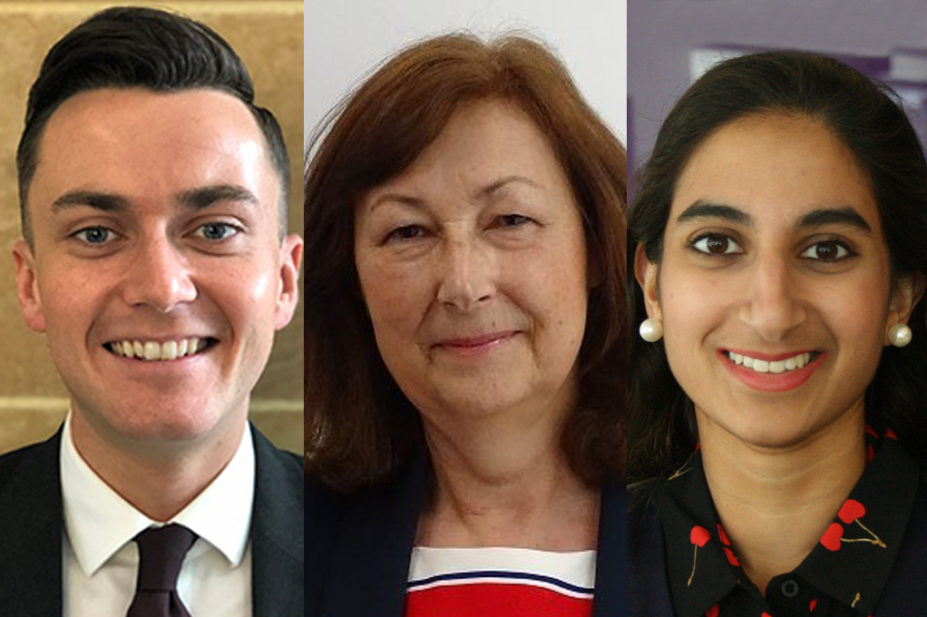
Royal Pharmaceutical Society / The Pharmaceutical Journal
The three Royal Pharmaceutical Society (RPS) national pharmacy boards held a joint Zoom meeting on 23 June 2021. It was the first meeting of the boards following the 2021 board elections, the results of which were announced on 14 May 2021.
Thorrun Govind, chair of the English Pharmacy Board (EPB), noted that apologies were received from Scottish Pharmacy Board (SPB) member Catriona Sinclair and Welsh Pharmacy Board (WPB) members Jamie Hayes and Sudhir Sehrawat.
Opening the meeting, Paul Bennett, chief executive of the RPS, welcomed all board members, “new and returning”, and offered his congratulations to those who were elected as board chairs, vice chairs and assembly members on 22 June 2021. Bennett also welcomed observers to the meeting.
New expert advisory group chairs
Cheryl Way, chair of the WPB, introduced the chairs of the RPS’s new expert advisory groups (EAGs): Anne Thompson, chair of the Primary Care Pharmacy group; Janice Perkins, chair of the Community Pharmacy group and Darren Powell, chair of the Digital Pharmacy group.
Clare Morrison, director for RPS Scotland, said group members were chosen for “depth and breadth of expertise” and to provide “overall balance in the topic area”. Morrison noted that the selection process was anonymised and that a balance of countries had been striven for. She added that the RPS is “keen to set up a wider network to support each EAG”, and that applicants who were not selected are encouraged to “get involved in those networks to feed their expertise in a different way”.
The three EAGs will meet for the first time later in July 2021.
Independent prescribing
Andrew Carruthers, chair of the SPB, asked the boards to consider the Society’s campaign to support pharmacist independent prescribers (IPs), which is being led by Jonathan Lloyd Jones, policy and engagement lead at RPS Wales, and Elen Jones, director for RPS Wales. Board members were asked what the campaign’s priorities should be and what challenges they thought might hinder the process of achieving those aims.
Lloyd Jones explained that the Society had already updated its 2018 policy on pharmacist IPs and it is now in the process of refreshing the RPS framework for all prescribers, ‘A competency framework for designated prescribing practitioners‘, as well as redesigning its practical guide for IPs. He added the the RPS will continue to “lobby so that policy becomes reality” and will engage with prescribers across the country to showcase work.
We can showcase minor ailment prescribing in Wales and Scotland to show what community pharmacy can do
Claire Anderson, english pharmacy board member
Way said that pharmacist IPs “need access to the patient record when making decisions about prescribing”.
Meanwhile, Alisdair Jones, a member of the EPB, said the biggest challenge “lies in community pharmacy, and how we develop capabilities but also services”.
“We need a clear idea of what community pharmacists will be prescribing: for example, acute or long-term conditions?” he said.
Claire Anderson, a member of the EPB, said: “If research isn’t happening, can we ask for it to be commissioned?
“We can showcase minor ailment prescribing in Wales and Scotland to show what community pharmacy can do,” she added.
Fellow EPB member Mary Evans responded: “Most prescribing now happens in organisations with governance structures.”
However, where a community pharmacy does not have such a support structure around them, “how do we ensure that governance and peer support?” she asked.
“We need some sort of infrastructure than keeps them safe and prescribing confidently, [such as] record keeping or peer support,” Evans said, adding that integrated care systems are “the only place in England where you get that infrastructure and support”.
Lloyd Jones thanked board members for their input, and asked for continued engagement on the matter.
Genomics and personalised medicine
Ravi Sharma, director for RPS England, told the board meeting that one of the National Pharmacy Boards’ 2021 action plans is to raise awareness, advocate for, and support members in the area of genomics.
Giving a summary of work to date, and the scope going forward, Sharma said the cost of genomic testing was going down and “could be streamlined into routine clinical care”.
He explained that the Society had spoken regularly with key stakeholders including NHS England, NHS Improvement, NHS Scotland and NHS Wales, and had been invited to fortnightly meetings with the NHS Genomic Medicines Service. He said that there are plans to engage with RPS members on the matter later in the summer.
On the policy side, Sharma told the board meeting how the Society is working to refresh the evidence base for its key messaging on the genomics issue, and had presented evidence on pharmacists’ potential role in pharmacogenomics to the ‘Pharmacogenomics in the NHS’ working group, which is hosted by the Royal College of Physicians and British Pharmacological Society. The working group is now preparing a report which will make recommendations to the NHS across the UK.
Pharmacists are experts in medicines so it is everyone’s responsibility to have some knowledge and to educate healthcare colleagues
ciara duffy, english pharmacy board member
Sharma asked the boards to consider how we integrate genomics into the pharmacy workforce. Alisdair Jones said that he used to work in oncology, where “personalised medicine was more common”.
“Building awareness with pharmacists and making it a fundamental part of the MPharm is going to be important,” he said.
Ciara Duffy, a member of the EPB, said that the Society should engage with the General Pharmaceutical Council, Medicines and Healthcare products Regulatory Agency and academia. She said it is important to “consider the impact for individual sectors”.
“Pharmacists are experts in medicines so it is everyone’s responsibility to have some knowledge and to educate healthcare colleagues,” she explained. “The role of the Qualified Person in ensuring these are quality medicines is really critical: we can support pharmacists in non-patient facing roles to become consultants.”
Inclusion and diversity
Amandeep Doll, inclusion and diversity (I&D) co-ordinator at the RPS, said that since the Society launched its inclusion and wellbeing pledge on 9 June 2021, there had been 759 signs ups to date, including 39 organisations. Doll invited board members to sign up too, if they had not done so already.
Tase Oputu, a member of the EPB, showed her support for the pledge and asked how the RPS would “know that it has had an impact on an individual level for our members”?
Doll responded that the I&D team are “working with our research team to look at an evaluation plan and put key performance indicators against it”. She said that the team has also run an equality impact assessment workshop, adding that the RPS survey on culture and belonging, which was published in November 2019, is planned to be repeated in 2022.
Andre Yeung, a member of the EPB, asked “how can organisations illustrate that their recruitment, promotion and HR matters are of a high standard and conforming to [I&D] governance? Can we get some standards around this?”.
Doll replied: “Pushing for those to happen will be a measure of success”.
Carruthers asked about including “social class in this [I&D workstream] — there is a huge link between this and other protected characteristics”.
Doll responded: “[This is] already in our equality impact considerations” adding that the team would be thinking about how we expand diversity in 2022.
Mike Maguire, a member of the EPB, then asked about how I&D was being incorporated into RPS Fellowship, to which Bennett responded: “All the work Amandeep Doll’s team does is relevant to the RPS, as well as externally. All we ask others to improve on, we should challenge ourselves as well, extending to recruitment, recognition and awards.”
Bennett added that the Assembly will discuss Fellowship at its next open meeting to be held on 13 July 2021.
RPS Connect
Morrison updated the board meeting on RPS Connect, a new online social networking platform being developed by the Society, with a view to launch in autumn 2021. The idea is to offer a service that can reduce isolation, allow people to share best practice, and provide a space to ask and answer questions. Members said they “wanted a safe space to interact” that was not in the public domain, Morrison explained.
The platform is currently being designed and early adopter testing should begin in July 2021.
Sustainability
Elen Jones, director for RPS Wales, said that environmental sustainability was a priority for the Society’s 2021 business plan. She said that Karen Hodson, policy and practice lead at RPS Wales and Iwan Hughes, RPS Wales public affairs and policy executive, were leading a cross-county team to take this forward.
If trends do not change, the UK is expected to run out of sufficient drinking water in 2045, Jones pointed out. And, in 2050, 10% of the UK’s hospitals could be under water. Jones added that healthcare amounts to 4.6% of global emissions, with the figure rising to “5.4% closer to home [in the UK]”.
The 2021 UN Climate Change Conference will be held in Glasgow between 31 October 2021 and 12 November 2021, and the RPS Scotland team has “made inroads for us, and talked to newspaper The Herald about us contributing to their ‘100 Days of Hope’ countdown to the conference”, Jones said.
The meeting discussed a draft declaration of a climate and ecological emergency to be released by the Society in due course. While the overall message was supported by the attendees of the board meeting, it was agreed by the three boards that the text of the declaration required amendment. The draft was referred back to Assembly for amendment before publication.
The date of the next joint national pharmacy board meeting was set for 23 September 2021.


